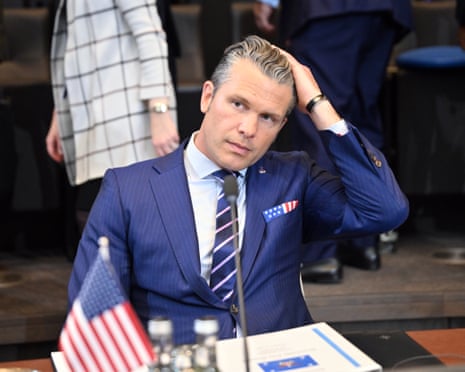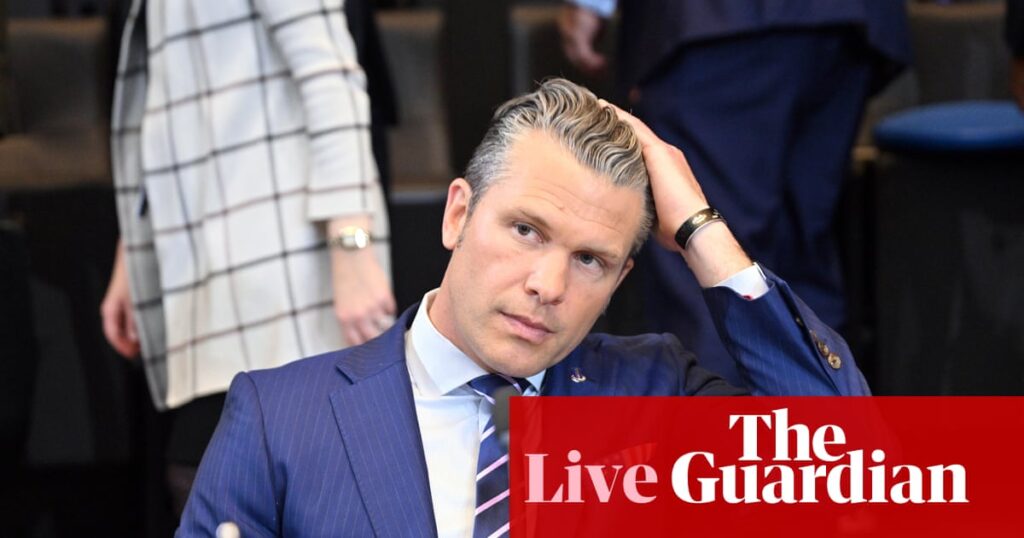Countries pledge to increase defence spending on Ukraine
Sweden, Estonia, and Finland pledged contributions on Wednesday to increase spending on purchases of US weapons for Ukraine, but countries including Spain, Italy, France, and Britain have faced criticism for holding back, Reuters reports.
US defence secretary Pete Hegseth on Wednesday urged allies to ramp up investment in the Prioritized Ukraine Requirements List (PURL) program, which replaced US arms donations to Ukraine and now requires allies to pay for US weapons deliveries.
He told reporters before a meeting at the alliance’s headquarters in Brussels:
You get peace when you are strong. Not when you use strong words or wag your fingers, you get it when you have strong and real capabilities that adversaries respect.
Our expectation today is that more countries donate even more, that they purchase even more to provide for Ukraine, to bring that conflict to a peaceful conclusion.

Nato Secretary-General Mark Rutte said he expected further pledges, noting that $2bn already had been committed through the mechanism.
However, this amount falls short of the $3.5bn Ukrainian president Volodymyr Zelenskyy had hoped to secure by October.
The Kiel Institute for the World Economy reported on Tuesday that military aid to Ukraine fell by 43% in July and August compared with the first half of the year.
Key events
After winning a major concession on pension reform from prime minister Sébastien Lecornu, France’s Socialists on Wednesday set their sights on including a tax on billionaires in the 2026 budget as talks over its passage began in parliament, Reuters reports.
Lecornu told lawmakers on Wednesday he would propose in November an amendment to the social security financing law in order to suspend a landmark pension reform until after the 2027 election, sacrificing one of president Emmanuel Macron’s legacy achievements to ensure the survival of his minority government.
The prime minister was threatened by two no-confidence motions filed by hard-left and far-right parties, but his pension reform concession ensured the Socialists would not back the measures.
“Passing the budget will be harder than surviving a confidence vote,” Rabobank macro strategist Stefan Koopman said in a note, adding that further concessions would fail to resolve France’s deficit issues.
Socialist leader Olivier Faure said his party would now fight to introduce its flagship Zucman wealth tax, aiming to raise revenue with higher taxes on France’s richest individuals.
“In the forthcoming debate, we on the left will be working together to defend the Zucman tax and public services and to protect the poorest,” Faure wrote in a post on X.
The tax, named after an idea put forward by French economist Gabriel Zucman, entails a 2% levy on wealth above €100m, affecting about 0.01% of taxpayers.
Giorgos Sideris, head of the association of hospital doctors of Athens and Piraeus, has said salaries of healthcare staff in the Greek capital have been “frozen” amid a dispute with prime minister Kyriakos Mitsotakis, the Associated Press (AP) reports.
Riot police were seen scuffling with medical staff at the University general hospital Attikon when Mitsotakis was visiting a new oncology department and the refurbished emergency department.
Health workers were protesting staff shortages, low pay and poor working conditions.
Sideris said:
They think we’re going to thank them because they owe us 10,000 days of leave. They think we’re going to thank them for keeping our salaries frozen.
The head of the association, who is a doctor at the hospital, said 130 patients had recently been sleeping on stretchers in corridors due to overcrowding and that an extra 125 nursing staff were urgently needed “just to operate at safety level.”
Riot police scuffled with medical staff at an Athens public hospital on Wednesday during a protest over the state of public health services held during a visit to the facility by prime minister Kyriakos Mitsotakis, the Associated Press (AP) reports.
Police in riot gear fired volleys of pepper spray and used shields and batons to push away doctors at the University general hospital Attikon who were demanding to meet with Mitsotakis, local media reported.
The health workers were protesting staff shortages, low pay and poor working conditions.
Mitsotakis, accompanied by health minister Adonis Georgiadis, was visiting the hospital in western Athens to attend the inauguration of a new oncology department and visit the refurbished emergency department.
The hospital’s new oncology ward was built with funding from a charity organisation, and is expected to care for more than 20,000 patients per year, a 41% increase from 2019, the prime minister’s office said.
Speaking during the inauguration, Mitsotakis said regular funding for Attikon had increased from €90m ($104.5m). Staffing levels had also increased, he said, “not to the level that we’d like, but we continue to insist on this great effort to comprehensively restructure the National Health System.”
Foreign donors have provided 93.3 billion crowns ($4.5 billion) to a Czech-led initiative to find and deliver large-calibre ammunition to Ukraine, and the Czech Republic has contributed 1.7 billion crowns, defence minister Jana Cernochova said on Wednesday.
Increased ammunition supplies in 2024 and 2025 have helped reduce Ukraine’s disadvantage compared with Russia on the frontline, although it is unclear whether the Czech action will continue under the next government.
Prime minister Petr Fiala said at a news conference with Cernochova that the Czech Republic has arranged supplies of 3.7 million artillery rounds to Ukraine, including 1.3 million so far this year.
Funding for the supplies has come from the initiative, as well as the yield on frozen Russian assets, bilateral cooperation and direct Ukrainian purchases, he said. Fiala said this year’s supplies should reach 1.8 million shells.
The Nato military alliance has intensified its intelligence gathering activities near the borders of Russia and its ally Belarus, Russian defence minister Andrei Belousov was cited by the Interfax news agency as saying on Wednesday.
Germany has agreed to negotiate with Turkey over potential deliveries of Eurofighter jets, a spokesperson for the foreign ministry said on Wednesday.
“The German government has responded positively to a preliminary request from Airbus to negotiate the delivery of Eurofighters to Turkey,” the spokesperson said. “These aircraft are used for collective defence within the Nato framework.”
He added that foreign minister Johann Wadephul will travel to Ankara on Friday to discuss the issue with his Turkish counterpart.
Afternoon summary
Here is an overview of the events that have occurred so far today:
-
Sweden, Estonia, and Finland pledged contributions on Wednesday to increase spending on purchases of US weapons for Ukraine, but countries including Spain, Italy, France, and Britain have faced criticism for holding back. US defence secretary Pete Hegseth on Wednesday urged allies to ramp up investment in the Prioritized Ukraine Requirements List (PURL) program, which replaced US arms donations to Ukraine and now requires allies to pay for US weapons deliveries.
-
The EU is pressing to have a new system of anti-drone defences fully up and running by the end of 2027, officials told Agence France-Presse (AFP) on Wednesday, as part of a push to ward off Russia. EU chief Ursula von der Leyen first called to create a “drone wall” to counter Moscow last month, hours after Nato jets shot down Russian unmanned aircraft in Poland.
-
Sergiy Petrovich Lysak has been appointed as the head of the Odesa city military administration, as confirmed by an order on the website for the president of Ukraine on Wednesday. The move comes after Zelenskyy on Tuesday revoked the citizenship of Odesa’s mayor on the grounds that he also had a Russian passport, acting to end the tenure of a divisive figure who has run the Black Sea port city for 11 years.
-
Russia struck Ukrainian power infrastructure with drones overnight, knocking out electricity supplies in several areas including in the central Dnipropetrovsk region, the Ukrainian Energy Ministry said on Wednesday. Power grid operator Ukrenergo said power supplies were limited in seven regions, most in the east. State-run gas firm Naftogaz said a thermal power plant had been hit, without identifying the plant.
-
Germany will spend €10bn ($11.6bn) in coming years for all kinds of drones, German defence minister Boris Pistorius said at a meeting of Nato defence ministers in Brussels. He also said that Germany will offer to take the lead in an EU air defence shield and that Germany will increase its contribution to air policing.
-
Belgium’s defence minister Theo Francken said on Wednesday the Belgian and Dutch governments will sign a missile defence systems agreement. Francken told reporters on Wednesday ahead of a meeting with Nato defence ministers: “We will sign an agreement with the Netherlands to have … (a) missile defence system. It will be the NASAMS system, the Norwegian System. We will buy NASAMS to protect our skies.”
-
Britain’s defence secretary John Healy said on Wednesday his country’s jets will keep flying over Poland until the end of this year as British commitment to Eastern sentry mission is extended. “We are also ramping up our drone production for Ukraine,” he told reporters before attending a meeting of Nato defence ministers in Brussels.
Belgium’s defence minister Theo Francken said on Wednesday the Belgian and Dutch governments will sign a missile defence systems agreement, Reuters reports.
Francken told reporters on Wednesday ahead of a meeting with Nato defence ministers:
We will sign an agreement with the Netherlands to have … (a) missile defence system. It will be the NASAMS system, the Norwegian System. We will buy NASAMS to protect our skies.
He added that Belgium, which recently opened an investigation into several drones flying over a military base, will have more anti drone and detection systems as soon as possible.
New EU anti-drone defence system to be running ‘by the end of 2027’, AFP reports
The EU is pressing to have a new system of anti-drone defences fully up and running by the end of 2027, officials told Agence France-Presse (AFP) on Wednesday, as part of a push to ward off Russia.
EU chief Ursula von der Leyen first called to create a “drone wall” to counter Moscow last month, hours after Nato jets shot down Russian unmanned aircraft in Poland.
The initial focus of the proposal was on bolstering the EU’s eastern border states but it has since been broadened out after mysterious drones rattled a string of countries farther west.
Officials told AFP that Brussels wants the project – now called the “European Drone Defence Initiative” – to begin initially working by the end of 2026, and to be fully functioning by the end of 2027.
The Guardian was unable to independently verify AFP’s report.
The initiative is one of several flagship EU projects set to be unveiled by the European Commission on Thursday in a roadmap aimed at preparing the bloc for a potential attack by Moscow by 2030.
Germany will spend €10bn ($11.6bn) in coming years for all kinds of drones, German defence minister Boris Pistorius said at a meeting of Nato defence ministers in Brussels, Reuters reports.
He also said that Germany will offer to take the lead in an EU air defence shield and that Germany will increase its contribution to air policing.
A spokesperson for the ministry added that Germany will deploy two Eurofighter jets in Polish Malbork from December to March.
Lawmakers from German chancellor Friedrich Merz’s centre-right CDU/CSU have reacted furiously to defence minister Boris Pistorius’ stance on army recruitement being voluntary, Agence France-Presse (AFP) reports.
Senior CDU lawmaker Norbert Roettgen told the Sueddeutsche Zeitung:
In 30 years in parliament, I have never seen a minister torpedo an important bill and plunge his own MPs into chaos like this.
Nato targets call for Germany to build up its total military strength to 460,000 troops – made up of 260,000 active soldiers and 200,000 reservists.
But the Bundeswehr is now a far cry from those figures, with around only 182,000 active soldiers and 49,000 reservists.
Pistorius hopes to avoid the need for a draft lottery, which has been pushed by Merz, by attracting more volunteers with better pay and benefits like free driving licences and technical training opportunities.
German defence minister Boris Pistorius hit back on Wednesday at critics within his own government as a row over army recruitment threatens to overshadow Berlin’s push to bolster its military deterrence, Agence France-Presse (AFP) reports.
Conservative chancellor Friedrich Merz, citing the threat of a hostile Russia, has tasked Pistorius of the centre-left Social Democrats with boosting recruitment to build up “the strongest conventional army in Europe”.
But the question of how to get there has led to angry recriminations, as Pistorius prefers a purely voluntary approach and Merz’s CDU/CSU has advocated the potential use of a draft lottery if necessary.
The coalition government had planned a first reading of a compromise draft law this week, but disagreement on the details sparked a row on Tuesday.
Pistorius told reporters on Wednesday that the idea of a draft lottery was a “lazy compromise” and would be too time-consuming in practice.
Russian forces have added a key upgrade to their drone fleet since the summer, according to Serhii Beskrestnov, a Ukrainian military and drone expert whose team studies intercepted Russian drones, the Associated Press (AP) reports.
Cameras and radio modems, which send and receive data wirelessly, have been fitted to various types of long-range strike drones. That allows operators to adjust a drone’s flight path in real time, sharply increasing precision compared to preprogrammed models.
Beskrestnov said locomotives are particularly vulnerable to the new technology, because they are relatively slow and follow predictable routes.
If the Russians keep hitting diesel and electric locomotives, the time will come very soon when the track will still be intact – but we’ll have nothing left to run on it.
The modified drones can fly up to 200km into Ukrainian territory while streaming video back to operators in Russian-held areas, Beskrestnov said.
An official at Ukraine’s defence ministry, speaking on condition of anonymity to AP, said Ukrainian forces also have recovered and examined a Geran-type drone fitted with a civilian camera and radio modem. The Geran is a Russian variant of the Iranian-designed Shahed.
Countries pledge to increase defence spending on Ukraine
Sweden, Estonia, and Finland pledged contributions on Wednesday to increase spending on purchases of US weapons for Ukraine, but countries including Spain, Italy, France, and Britain have faced criticism for holding back, Reuters reports.
US defence secretary Pete Hegseth on Wednesday urged allies to ramp up investment in the Prioritized Ukraine Requirements List (PURL) program, which replaced US arms donations to Ukraine and now requires allies to pay for US weapons deliveries.
He told reporters before a meeting at the alliance’s headquarters in Brussels:
You get peace when you are strong. Not when you use strong words or wag your fingers, you get it when you have strong and real capabilities that adversaries respect.
Our expectation today is that more countries donate even more, that they purchase even more to provide for Ukraine, to bring that conflict to a peaceful conclusion.
Nato Secretary-General Mark Rutte said he expected further pledges, noting that $2bn already had been committed through the mechanism.
However, this amount falls short of the $3.5bn Ukrainian president Volodymyr Zelenskyy had hoped to secure by October.
The Kiel Institute for the World Economy reported on Tuesday that military aid to Ukraine fell by 43% in July and August compared with the first half of the year.

Pjotr Sauer
Pjotr Sauer is a Russian affairs reporter for the Guardian
When Vladimir Putin first announced he would host a “Russia-Arab world” summit, the Kremlin imagined the region’s leaders flying to Moscow to discuss regional security and energy relations, with the Russian leader presiding.
Announced in April and prepared for months, the summit had been scheduled for Wednesday, intended as a showcase of Moscow’s enduring influence in the Middle East and proof it remains far from isolated despite western sanctions.
But Putin was forced to shelve the gathering after only a handful of leaders, including Syria’s president, Ahmed al-Sharaa, and the head of the Arab League, Ahmed Aboul Gheit, confirmed their attendance.
Instead, on Monday, global attention turned to Egypt, where world leaders gathered for a Gaza “peace summit” – with Russia notably absent.
At Sharm el-Sheikh, Donald Trump joined Egypt’s Abdel Fatah al-Sisi in welcoming heads of states from across the Middle East and Europe as they signed a long-awaited Gaza treaty, with leaders jostling to be photographed beside the US president.
While analysts say Moscow was never expected to play a major role in the Gaza peace process, its absence in Egypt underscored a reality the Kremlin is reluctant to admit: as the war in Ukraine grinds on, its influence in the Middle East – long touted as a counterweight to that of the west – is waning.
You can read the full piece by Pjotr Sauer here: Putin’s embarrassing cancellation of Arab summit signals waning influence in Middle East

